- What John Lennon Thinks of Donald Trump - November 14, 2016
- The Meaning of Fun: The Paul is Dead Rumor - February 3, 2016
- BEATLES-STREEP-SHEA SHOCKER: IT’S NOT HER!!!! - August 13, 2015
DEVIN McKINNEY • Offered in spirits of love and objectivity:
One notices that the talk at Hey Dullblog tends, in a broad sense, to revolve around, or devolve toward, precisely two subjects: John and Paul. (Or John or Paul; or John versus Paul. Or John. Or Paul.) Start at virtually any discussion point, and reader heat will amass itself around their two heads—as if they were not just the most interesting of the four, which they are, but as if they were the four in total, which they are not. It’s only natural, in a sense, to gravitate to John and/or Paul rather than George and/or Ringo, because they wrote most of the songs, determined most of the direction, produced (in Paul’s case, at least) larger bodies of work, and thereby make themselves more available, both individually and interpersonally, to our intrigued analysis. But because the gravitation is natural and the resultant conversation easier does not change the fact that George and Ringo deserve their piece of our action. Their relative absence from our boards is a way of saying that they don’t matter. I don’t think any of us believes that. But what are we going to do about it?
The presence of an absence
In assembling my Top 10 Beatles musical micro-moments recently, I found myself returning, again and again, to Ringo’s drumming. Which got me thinking, not for the first time, how few bytes are devoted on this blog to extolling the essential virtues, or merely noting the more-than-incidental existence, of the two Beatles who were not John and Paul—those virtues including ones of musicianship, personality, ego maintenance, and ego imposition. (Do we forget that Ringo was the first to quit the Beatles? And that George was the second? No, but yes.) A couple of years ago there was a flutter of commentary at Hey Dullblog around George, spurred by the co-release of the Living in the Material World documentary and Early Takes: Volume 1 album; but the flutter passed, and much of it was taken up with the concern of some folks that a trend might be afoot to mistakenly accord George more than due credit in the band’s alchemy-synergy-syzygy-whatever—which is another way of effectively withholding from him any credit, and thereby choosing not to deal with the caress of his solo on “Something,” his drone-whisper vocal on “Long, Long, Long,” his early forays into Moogscaping with Electronic Music, or the fact that many earlier Beatles tracks were made to live and bleed by his knife-like interjection of the vital guitar slice.
There’s an enormous backlog of Harrison and Starr work, both within and beyond the Beatles’ group output, which simply never gets mentioned here. The truth, yes: Most of the work I’m referring to—the solo work—is bad. Some of it, depressingly so; some of it, to which I’ve exposed myself seldom and judiciously, so bad as to nearly defeat my will to live. And many would call that sufficient reason to not waste space on it—even blogspace, though it is theoretically unlimited and doesn’t kill trees. But as a critic, I want to read someone who cares about an artist say why and how the artist’s work is bad, when it is, for the simple reason that exposure to bad work is utterly essential to focusing our sense of good work. It helps form our larger comprehension of an artist’s unique contribution, the shape of his or her artistic personality, just as bad days as well as good help form our comprehension of life. (Certainly we at HD have applied this logic to Paul, whose musical misfires and close-but-no-cigars, along with his great and “merely” interesting work, have received ample airing in our posts.)
Don’t just say you’re going to swallow the world; swallow it
There are at least two more reasons why the work of Harrison and Starr should be recognized at Hey Dullblog—even if that recognition amounts to simply “Guess what, that drum fill really kicks it up a notch” or “Guess what, the critics were right about [insert windsucking solo album here] all along.” The first reason is that Hey Dullblog is a Beatles site, not a John-and-Paul site. It was always implicit in our mission that everything in the Beatle world—for that matter, anything tangential to but somehow touching that world—lay within our scope; and I often feel we don’t put that voracity to a hardy enough test. It’s like the old saw about how you use only a small percentage of your brain’s full potential: Often we fall back to the fall-back of John-and/or-Paul because we’re not reaching beyond conversations we’re already comfortable having.
Sic semper tyrannus!
The second reason is that, right here, Hey Dullblog has a perfect opportunity to do what it always says, or at least implies, it would like to do—reconsider, or rewrite, or overturn entirely the critical-historical orthodoxies that exist around the Beatles, which are (sometimes against contradictory evidence, but whatever) seen to have taken seed in the virgin soil of late ‘60s Rolling Stone, and grown therefrom into a virtual consensus on John Lennon’s identity as the band’s sole genius, and a Paul-bashing industry which is only now beginning to crumble before the unimpeachable evidence of decades and the enormity of a musical corpus to which the term “wide-ranging” is woefully inadequate. But George and Ringo have likewise been the victims, or at best the unwilling recipients, of limiting judgments—which, in their case, back-seat them to their ruling geniuses, and assign values to their group and solo work that, to me at least, sometimes seem merely critic-conditioned and era-specific, and are to that extent open to the same revision that has, on the one hand, anointed RAM a box-worthy magnum opus, and on the other, demoted Double Fantasy to something less than the conjugal classic it was considered, understandably, to be in the immediate wake and lasting aftermath of John’s murder and Yoko’s bereavement.
For all the attention George and Ringo get at Hey Dullblog, anyone would think they were a glorified Jesse Ed Davis and Jim Keltner. Is that the case? Then let it stand examination. Is the case more complicated than that? Then let us complicate it. Is there no one here who might find shades of reevaluation in George’s or Ringo’s work or overall role, within or without the Beatles? Is the RINGO album still as good today as it was when we were 15, or 27? Is Gone Troppo still as bad? I, for one, would be curious to see a thoughtful consideration of, say, the strengths and weaknesses of the Dark Horse or Ringo’s Rotogravure albums from the perspective of, not 1974 or 1976, but right now—not necessarily because they will contain forgotten treasures, but because they are unfamiliar, far from exhausted subjects, and because they constitute a large portion of those vast Beatle realms to which we never turn our attentions here because they are not marked “John” or “Paul.”
And who knows, maybe those bad albums do contain treasures we’ve forgotten, or tuned out at the time, or never heard in the first place. Treasures are sometimes found in the trash. At the very least, I can attest that I find Living in the Material World to be half an astonishingly beautiful album, and that that half merits comparison with the highlights of All Things Must Pass. Yet after being drubbed or dismissed at the time by Robert Christgau, the run of the rock press, and the Carr-Tyler Beatles Illustrated Record (a book which, much as I adore it, shaped or misshaped my opinion toward the Beatles’ collective and solo work for more years than I care to admit), Material World, along with its numerous neighbors in the bizarre Harrison menagerie, has pretty much dropped out of the ongoing Beatles conversation. This is partly due, it’s true, to an almost complete absence of the kind of estate-based curatorial efforts which, vide the steady stream of reissues and revamps from the Lennon and McCartney camps, insist on a revisioning of works whose aesthetic worth seemed to have been decided eons ago. (See again RAM, and its likewise boxed-up Macca siblings; and, from John via Yoko, Menlove Avenue, the Lennon Anthology box, the Acoustic demos, etc.) We’ve been working for some time to rehabilitate Paul from his near-crippling at the hands of Jon Landau and know-little rockists. Let’s do something for George and Ringo—or at least look into their case files. If they are beyond rehabilitation, attention will tell.
The prescience of an abscess
So enough preamble. My New Year’s resolution, decided just this morning, is to get more George and Ringo into Hey Dullblog. I vow to devote numerous postings in 2014 to one or the other (or both)—along with whatever other Beatlecentric notions flit across the blank space between my ears: appreciations of their moments of mastery and transcendence, and cold-sober considerations of their mooning croons, rickety licks, fusty funk, and deadly disco. If you ask how one shows respects to Messrs. Harrison and Starr by highlighting portions of their catalogs that have lain cold and stiff lo these many years, I answer that attention of any kind is a form of respect, and furthermore that serious attention—honest, sympathetic assessment from a foundation of love and admiration—is the highest respect a critic, or any fan, can pay an artist.
This all begins with tomorrow’s post: a new approach for a new year.

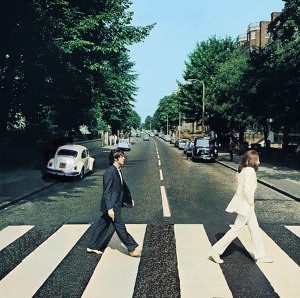
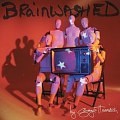
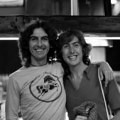


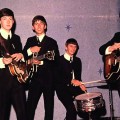
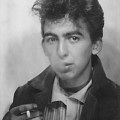

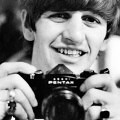
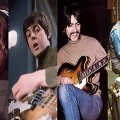
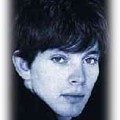
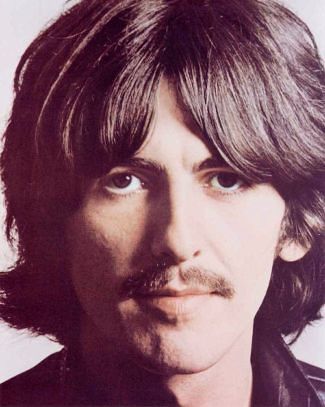
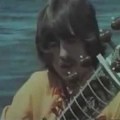
What a wonderful post; as ever thank you, Devin.
Challenge accepted. Funny thing, I think more about George these days than I do any other Beatle, because I’m often coming into contact with the Eastern philosophies that he espoused. It feels chancy, or unseemly, to talk about this kind of thing in the context of HD, so I don’t–but I pretty much endlessly wonder how his practice and these tenets stood up to the brutal road-test of an exaggerated life.
I think one of the things that made our George discussion peter out is how the Scorsese documentary—as Anthology before it—pointedly refused to dig into any of the seamier aspects of George’s personality. John and Paul are endlessly interesting because one sees (or seems to see) the good and the bad roiling around inside them. Those have been (mostly) airbrushed out of George.
With Ringo, the issue that fascinates me most is his sobriety; as with George, it is a belief system fundamentally in opposition to what made him become a Beatle, and a lifestyle 180 degrees from how he lived while in the group. I wonder how Ringo looks at his life from 1957-70, and his Beatle friendships, through the lens of long-term sobriety. What was it about The Beatles experience that caused George and Ringo to run to refuge?
So perhaps I’ll write a post about these things, if I can figure out how to do so in a respectful way. John and Paul were each professionally revealing; George and Ringo were not scrutinized to the same degree, nor courted that scrutiny, and so there is less raw material to work with. But I agree wholeheartedly that The Beatles were a four-chambered heart, and our “economy class” Beatles can, and should, come in for their share of study.
Here’s a link to some of the photos in Ringo’s new book. I found his descriptions fascinating:
http://www.esquire.com/blogs/culture/ringo-starr-photos?click=feed
Just recently I gave George’s Extra Texture another chance after not listening to it for probably 20 years, and I was acutely embarrassed at ever misremembering this album (especially “The Answer’s At the End”, “World of Stone” and “Grey Cloudy Lies”) as being anything less than stunning. Critics tend to go on about how “You” is the only “worthy” recording on the LP (presumably because of the ATMP/Spector/Dominoes connection), and while most of the rest of the album IS slow, ponderous and presumably the opposite of what passes for “cutting-edge” in the Rockist camp, it is also dazzlingly beautiful. I would even argue that the songs are better than much of “Material World”, and that the album is an improvement over that record and Dark Horse because there are no obvious “Krishna” songs (not that I actively dislike those, but I do find the sentiments of something like “The Light That Has Lighted the World” hard to swallow).
Perhaps because they weren’t as adept at relentless self-promotion as J&P (or at publicly constructing redemption narratives from whatever happened to them, as already pointed out by Devin in his last paragraph), the fact that the mid-70s were apparently a terrible time for George and Ringo, and how this may have been reflected in the music they made, isn’t really ever discussed anywhere. Everyone, it seems, knows about Paul’s breakdown after the split and John’s LA adventures (and the mileage they got out of these phases for their solo albums), but it is at least as noteworthy that George managed to come up with Extra Texture after the private (divorce/drugs/hepatitis etc) and public (Dark Hoarse) fiascos of the previous year or two.
Sadly, Ringo’s music never recovered after Rotogravure was his first genuine flop – perhaps because he just didn’t care that much anymore after Maureen was gone? (Richard Burton’s diary entry for 27 September 1975: “Ringo out of his skull. Very unhappy man.” Footnote: “Ringo Starr’s marriage to Maureen ended in divorce in July 1975.”)
Oops, sorry, that was Mike’s last paragraph, of course.
Thank you, Mike, and thanks Sam for the link. I love Ringo’s photos. I’ve been trawling the Internet since this book came out, yanking JPEGs off.
Amazing, Velvet Hand, especially that Richard Burton diary leaf and your trenchant remarks on how bad the 70s must have been for George and Ringo. Paul, I guess, took comfort in the bosom of his family, both real and extended (Wings); but George and Ringo (and John!) dealt by hanging out in superstar communes with their boyfriends and revolving girl toys, getting drunk, blowing coke, and living on their own versions of the edge.
Musically, I’ve got those 70s albums of George lined up and waiting for another listen; 33 1/3 is the one I remember liking most years ago. I have the Ringo albums, just to have them; a few I’ve never listened to, for fear. But this will be the year.
Regarding the Beatles in the 70s, Devin, I think that the four of them were doing exactly what they’d done in the 60s: embodying trends that a lot of people were indulging in–being the pennant at the top of the ship (I think I’m mangling this Lennonism). The difference is that the trends of the 60s have worn better—or seem to—than those of the 70s.
Paul went back to nature, and his family.
John entered into a self-consciously “equal” relationship with his wife, lived the decadent life for a bit, then started a family, too (full of paradigms that were new in the 70s–woman as breadwinner, yoga, pop-psych, macrobiotics, etc).
George devoted himself to personal improvement via Eastern religion, like Lennon falling off the wagon and getting back on, dabbled in the Euro rockstar jetset, and connected with comedy—the rock and roll of the 70s.
Ringo attempted to continue his Beatle life, oscillating between family and partying.
The habits of the individual Beatles had less of an impact on the 70s because broken into four they were much less powerful a cultural force; and the culture itself was already starting to splinter—there was no center, and hadn’t been since ’68. But I think their restless malaise was of a piece with the decade itself; I personally don’t find the 70s a drag, but lots and lots and LOTS of people who loved the 60s and felt that decade was a highpoint (personally and for the West) found the 70s to be profoundly bleak and dissatisfying–hollow, somehow. As John, Paul, George and Ringo seemed to.
The question is, would they—and we—have felt differently if the group had gotten back together? Could there have been a Sgt Pepper for the 70s, encapsulating those trends as Pepper did for psychedelia, Pop and Op, etc? Or was the culture too split already? Diversity is wonderful but lonely. Monoculture is cozy, safer somehow even when it’s radical, and I think a lot of the chilliness of the 70s is this “we were a group, but now everybody’s on their own and everything is up for grabs”–something again that The Beatles embodied.
I’ll start the George bandwagon rolling–I think his work on Revolver is absolutely critical to that album’s success. You can possibly take away two or three John songs (which the American version did), or maybe even one or two Paul offerings, and you’ve still got Revolver. But take away George’s three contributions, and you’ve got a decidedly lesser work. In fact, there are days when I think “I Want To Tell You” is the best damn thing on the album.
Agree, @Beasty. Revolver without George is a totally different (and lesser) album. From ’66 on, his stuff is just essential to what the group was creating—I find it impossible to imagine White without him, or Abbey Road—which is ironic, given his increasing alienation from John and Paul, and the idea of Beatledom.
I recall that George was writing “Art of Dying” and “Isn’t It a Pity” in ’66-’67; imagine THAT on Revolver or Pepper! And given that, one wonders if Paul pinched “Hey Jude” from George. 🙂
I can only echo what others have said on here about what a great, thought-provoking post this is. I really related to the reference to the Carr-Tyler ‘Beatles Illustrated Record’ book. I first got that book when I was about 10 and it greatly influenced my thinking about the music for years. Their complete dismissal of RAM seems absurd in retrospect.
I’m reminded of how in the “Concert For George” movie, so much of his solo material is overlooked, even by those who knew and loved him best. They do plenty of Beatles songs, of course, and a little All Things Must Pass but I don’t recall anything from after that except for a bit of Traveling Wilburys. Or am I forgetting anything?
Hope this isn’t a double post:
Hear hear! Capital notion!
Perhaps I’m forgetting something, but nothing from George’s solo catalogue strikes me as being “embarrassing,” and I prefer his solo-work to John’s, actually. George’s lesser stuff strikes me as simply boring, whereas Paul’s missteps are often laughably disastrous (‘course, as a giant Paul-fan who is endlessly fascinated by him, I’m inclined to regard those as “interesting failures,” but still).
And George was certainly extremely interesting as a person and historical figure. 🙂 I’m excited for this! Good call, Devin!
Thanks everyone for taking this in the intended spirit–not rebuke but reminder, of myself as much as anyone. I’m really looking forward to what everyone will bring to this. Velvet Hand’s great comments on Extra Texture above are exactly what I had in mind. Those memories are there, if we access them; and if they’re not, it may be because we need to expose ourselves, if only for curiosity’s sake, to those great amounts of unsung, unloved, or simply overlooked work.
Glad you liked ’em. I was wrong about the hepatitis thing, though – this was, it seems, around the time he recorded the NEXT record (33 1/3). Which I’ve never heard. Is it really that good then?
Also: “It Don’t Come Easy”/”Early 1970” – best Beatles solo single. Discuss!
I remember I was in high school when 33 1/3 came out. I bought the album and it was in frequent rotation on my turntable. Around that time, I was watching SNL and George appeared with Paul Simon (their performance has been uploaded to youtube):
http://www.youtube.com/watch?v=uiOr5WoAJgg
I remember thinking “Crackerbox Palace” would have made a good Beatles single. As well as “Baby Don’t Let Me Wait Too Long.”
I am definitely guilty of ignoring George and Ringo. First, I have to admit: I have little or no interest in either of their solo work. I have never purchased a Ringo album and probably never will. As for George, I have bought his stuff and tried to like it but his voice is just not that interesting to me and his albums have little diversity in style. Plus, I am not a spiritual person, and I am actively distrustful of his Hari Krishna ramblings. I love a handful of George’s songs (like the glorious All Things Must Pass) but I confess — and I’m sure this will offend some George fans — most of his solo stuff just bores the hell out of me.
Plus, lately I’ve been annoyed with George for something that is not at all his fault. I feel like we’ve passed out of the St. Lennon period and we’ve now entered into the St. George period in Beatles fandom. I see a lot of comments on how George was “the best beatle” (whatever that means) or “the most talented” (absolute nonsense!) or “the nicest Beatle” (if you think that George sleeping with Ringo’s wife and helping contribute to their divorce makes George “nice”) and “the most humble Beatle” (if you think living in a 120-room mansion makes you humble). I’m not sure why people need to put at least one Beatle up on a pedestal but it seems we do. My point: George is presented as this caricature without faults when he had his share of faults just like the other Beatles. And of course all of the blame for “poor” George getting “sidelined” in the Beatles is always laid at the feet of Paul and John, but especially Paul, which is odd because John was the one who found somewhere else to be in the studio often when it came time to work on George’s songs while Paul always helped George. And much of the reason George progressed more slowly as a songwriter was due to his own decisions: George had the lead track on Revolver and 2 other songs and he chose to then spend months learning the sitar rather than bringing in songs: how is that Paul and John’s fault when it was George’s choice? Anyway, some people nowadays treat George as if he had no faults, when he clearly had his share. And they use George as an excuse to demonize John and, especially, Paul for being “controlling.” IMO, the difficulties in the George-Paul relationship were caused by BOTH men — not just Paul. Two-way street. George wasn’t always kind or respectful to Paul. I’m fascinated by the George-Paul relationship because I think it’s more interesting than the John-George relationship, which seems mostly governed by George following John around to get his attention. But I don’t want to simply discuss what John and Paul “did” to George, as if he wasn’t a thinking mature adult who contributed to the tensions himself in many ways. I don’t want to discuss George purely as a “victim,” which happens all too often in Beatles fandom. He’s more multi-layered than that! For example, reading Lewisohn’s book, it’s shocking to see that, for all these years, people have blamed Paul (of course!) for pushing Pete Best out of the band. But Lewisohn shows that it was George who was conspiring to oust Pete and bring in Ringo (amazing to think how much stick Paul has gotten for that when George was the ringleader here). Anyway, I think there’s clearly plenty to discuss about George and Ringo, about their actions and interactions within the band, and their work, together and solo (though I clearly won’t have much to contribute on that front, especially about Ringo). And I guess I’m up for more discussion of both Ringo and George, so long as we all take off the rose-colored glasses about both of them, just like we’ve taken off the rose-colored glasses about John and Paul.
@Drew:
“poor” George getting “sidelined” in the Beatles is always laid at the feet of Paul and John, but especially Paul, which is odd because John was the one who found somewhere else to be in the studio often when it came time to work on George’s songs while Paul always helped George.
I expect this is partly due to the fact that George talked much more freely about his difficulties with Paul than with John. There are a whole host of reasons this might be, but I think at the end of the day George was actually more secure in his relationship with Paul. Of all the Beatles theirs strikes me as the most typically “brotherly” relationship in the Beatles. In short: Paul would take crap off George and love him anyway. John OTOH was liable to either lash out viciously (“HDYS”) or cut you off indefinitely, as he did when George dared to only mention John a dozen times in his “autobiography” (the unconventional concept of which didn’t call for much ink on any of the Beatles, anyway). Even years later, John’s quip after declining a call from George was, “He should have thought of that before he wrote that book.”
Have there been any good biographies of Ringo? I saw one in my local library, a thick volume, and it seemed kind of dense. I tried reading a few pages, and found the prose impenetrable.
After reading some of his comments/captions to his photo book, I think anyone attempting a bio would do best to just let Ringo tell his own story, in his own words.
sam, there is a very good biography on Ringo by Alan Clayson entitled, “Ringo Starr: Straight Man or Joker?”.
Thank you, J.R.
I took a peek at it through amazon, and it looks interesting. Who can’t love a biography that begins with a quote from G.B. Shaw?
Devin, I agree that there’s too little said on HD about George and Ringo, and I look forward to seeing more commentary on them here in the new year. I’d particularly love to see someone who strongly connects with George’s, or with Ringo’s, solo work write about it here. The best insights will come from someone for whom the work resonates deeply.
That won’t be me, because apart from “Brainwashed” (which I think is one of the best Beatles solo albums), parts of “ATMP,” and the songs collected on the two Harrison “best of” LPs, I can take or leave most of George’s solo music. I don’t dislike it (except the really preachy songs), I just don’t feel much about it one way or the other. I think that says more about me than about George, and I’d enjoy learning what someone who does greatly care for it hears in it.
As for Ringo, I think in the post-Beatles years he’s mainly interesting as a performer. He and Paul clearly love playing for audiences, while John and George were much more ambivalent about doing so.
During the Beatles years there’s absolutely no doubt about how vital their musical contributions were (and in George’s case, his songs as well). One reason I think they’re harder to write about within the Beatles’ dynamic is that a big part of their contribution was negative — in the sense that they were willing to NOT be in the front seat of the car all the time. If the Beatles had been made up of four people constantly grabbing for the steering wheel, the band would have crashed and burned long before it did.
The most fascinating thing about George, to me, is how torn he clearly felt between wanting to see the material world as “maya” and wanting fame and glory. Recently it was reported that he refused an OBE in 1999; characteristically, we have no comment on why by George, but Ray Connelly claims George would have felt “insulted” by being offered an OBE after Paul had been offered a knighthood.
http://www.classicrockmagazine.com/news/the-beatles-george-harrison-refused-obe/
Agreed, @Nancy. I too hope that people who find George’s/Ringo’s work/lives resonant and inspiring will comment and elaborate. I hope we haven’t driven them away with the John/Paul tunnel vision.
The OBE: it’s hard for me to imagine George refused the OBE in direct protest of not getting a knighthood while Paul did. I doubt a knighthood would have meant much to him, anyway. But I can see him suspecting the offer was some sort of “oh, well, here’s a consolation prize, seeing as you’re dying and all,” thing, which WOULD be massively insulting. So I don’t blame George at all for saying, “Whatever, keep your stupid medal.”
Then again, his “After all we did [financially] for Britain, all we got for it was the lowest honor possible” line in Anthology, he did seem truly disgruntled. ‘Course, he followed it up with a very Georgian chuckle. 🙂 Which may have been in acknowledgment of the absurdity of the whole thing.
I don’t know how strong my connection with their solo work will prove to be, Nancy, but it is my goal over the next year to hear or rehear as many of George and Ringo solo albums as I can gather to hand without having to go three towns over for a vinyl copy of “Stop and Smell the Roses” (or something), and then to write about my responses to same, in the hope that others will be curious enough to give a listen or relisten or rethink and give me some sort of exchange on musical matters. As I noted, I’ve not heard most of Ringo’s solo work, and I move toward it with, shall we say, modest expectations. I worked my way through George’s solo oeuvre some 10-12 years ago, and recall mostly the volume of dreck I encountered. Not because the albums are necessarily badly done but because so often George’s musical tendencies in terms of rhythm, arrangement, etc. are securely in my yuck zone–especially as he moves away from the Wall of Sound influence and toward the faceless funk ‘n’ roll of the LA studio axis. But that was long enough ago that I’m curious to tackle that body again and see what turns up this time. That’s mainly what I’m going on here: curiosity. That, and a willingness to be surprised.
Annie, I love that moment when George dismisses the MBE: “For selling all that corduroy, and making it swing, all we got was a cruddy leather medal with wood and string through it.” I think I remember the exact quote, because it was such a brilliantly, spontaneously turned phrase. (And the “Georgian chuckle” set it off perfectly.) He had at least one other in the Anthology that I’ve never forgotten: “the dreaded lysergic.”
His snarky, prickly, curmudgeonly thing was unique in the group dynamic (albeit an eminently English quality), and I’ve always enjoyed it because it was a) as I say, unique in the group, and b) fun to watch as a style, just as much as any of their styles. Unlike some people, I was never irritated by his whingeing because I never took it personally.
Speaking as an individual, I have never encountered any commentary–none I’d take seriously, anyway–nominating George for sainthood. All of the evidence is overwhelmingly to the contrary, in fact, and I find more than sufficient testimony from the man himself as to his own humanness to offset the preachier aspects of his presentation. Likewise, any estimation of him as the most talented or most interesting Beatle is ill-premised to the point of inconsequentiality. I don’t let the ramblings of fools affect my own conception of George, any more than when John is held up as one of the great political figures of the last century, or Paul as a “generic genius” whose insides are filled with cotton candy, or Ringo as a jovial boob who was “in the right place at the right time.” Take to heart what these vaporous and spectral “others” say about the Beatles, and none of them would survive. Too many people grinding axes, working out resentments, and, as we’ve many times and quite rightly deplored on this site, elevating one Beatle at the expense of another–the only effect of which is to diminish everyone and everything. That’s where objectivity is essential in making assessments: It provides a filter against the simplicities of simpletons, not to mention our own prejudices.
And of course, there’s George on meeting Elvis, also in the Anthology: “I spent most of the party trying to suss out from his gang if anybody had any reefer.” Huh huh huh, etc.
George’s solo career matters to me a great deal. Sure, I was one of those people who used to think of George as a “favorite Beatle.” But in my case, I think “favorite Beatle” means favorite “ex-Beatle.” (Now I’ve shifted over to ex-Beatle Paul somewhat because — well let’s just say his longevity, his talent, and his prolific nature have built up a body of work that is rather brilliant, sometimes achingly so, even if a fair portion of it is insipid.) Though I’m interested in the Beatles as people and in their relationships to each other, their creation matters much more to me. George’s career is problematic, of course, but his best stuff holds up to anything the other ex-Beatles ever did. I wish I had more time to get into this stuff, but maybe I’ll post about a record I’ve just listened to, ‘33 1/3’. Honestly, you’d be doing yourself a disservice not giving this one a chance. Some of it is downright fabulous. (Few of the ex-Beatles records hold up all the way through. One learns to pick and choose among a collection of songs.) The first three songs are all standouts and reflect a range of styles that would do Macca proud. ‘Woman Don’t You Cry For Me’ is a jaunty funk number, very bass heavy, with a nice guitar solo. I don’t think George did anything quite like this before or after. ‘Dear One’ is the kind of song that would divide this forum. I’m an atheist, but I’ve never minded George’s spiritual songs or their sentiments. His best ones make me feel like I do when I walk into a gorgeous cathedral. I don’t have to believe to be awed somehow — and ‘Dear One’ awes me a little. This isn’t to say that some of his spiritual songs don’t plod along drearily, but the best of them help you understand the power of faith, not just George’s faith. The real revelation on this album is ‘Beautiful Girl.’ It’s as gorgeous as anything John or Paul ever wrote, up there – in my ‘umble estimation – with the best of the Beatle love songs. Interestingly, according to George, he wrote it in 1969, which makes sense because it has that A-game feel about it, like he was thinking of presenting it for group consideration. You’re missing out if you don’t hear this group of songs, especially ‘Beautiful Girl.’ As for the rest of the album, it’s actually quite listenable. I’ve never really got much out of ‘This Song’ or ‘Crackerbox Palace’, which are the “hits,” but at least they demonstrate George’s humorous side. Parts of the album have dentist’s office written all over them, though your average dentist’s office could do worse than ‘Pure Smokey’ and ‘Learning How To Love You.’ But I have all of George’s albums and can vouch for what’s good.
Joe, thanks for your comment! I’d love to read a full-length post by you about 33 1/3. That’s one I haven’t listened to in a long, long time, and I should give it another chance. I’m also totally with you on Paul’s post-Beatles work career as building up “a body of work that is rather brilliant, sometimes achingly so, even if a fair portion of it is insipid.” (Applies to John’s solo career too, IMO, if you factor in “Life with the Lions,” “Wedding Album,” etc.). All the more reason for giving George another listen.
Though I’m interested in the Beatles as people and in their relationships to each other, their creation matters much more to me. Me too, Joe.
33 1/3 is the one I’m most curious to rehear, since I liked it best of those late 70s George albums and it was heralded at the time for its rediscovery (or perhaps simply discovery, in George’s case) of humor, “Crackerbox” and “This Song” (the latter of which I love) being the primary instances, and also minor hits.
“Beautiful Girl” is present as a 1969 demo on Beware of ABKCO!, the bootleg I mentioned over in the Early Tracks post.
Devin, of course — I’d forgotten about George’s unfinished version of ‘Beautiful Girl’ on ‘Beware of ABCKO!’ Thanks for the reminder. I just gave it a listen — it’s a gem of a demo that I think he polished quite well on ’33 1/3′. (I have to say, I wish the Beatles had done a version of this one. You can almost hear how Paul’s background vocals would have enhanced it.) While I’m here, let me put in a good word for his late ’70s album ‘George Harrison.’ Many on this forum might know it for its relatively bloodless version of ‘Not Guilty’ and perhaps for the songs ‘Blow Away’ and ‘Faster’. But ‘Soft-Hearted Hana’ is a great song, and ‘Your Love Is Forever’ should be filed under Frank Sinatra — and I mean that in the best way. It proves to me that George built up a small body of exquisite love songs. Perhaps you could say this one refers to his love of god, but then you’ve got to hand it to the man for writing a song that could be taken in different ways. ‘Soft Touch’ is also lovely, and the CD version has a bonus demo of ‘Here Comes The Moon,’ which sounds much more profound stripped down than the rather less palatable, overly produced version on the album.
I saw this clip of Ringo on Conan’s show:
http://www.youtube.com/watch?v=98_gMcma9hY
I was impressed and amazed when he said Rory & the Hurricanes had been scheduled to appear on the same bill as Eddie Cochran in Liverpool, but that Eddie’s accident ended the tour.
I told a friend who is an authority on all things Eddie Cochran, and he said this was untrue. Eddie’s last show in Bristol was the last gig of a very long tour, which had included a show in Liverpool that George Harrison had attended. Eddie and Gene decided to take a taxi to London so they could get ready for their flight home that was leaving the next day. So Ringo’s anecdote is clearly, provably untrue.
Was Ringo just making up stuff? Does he believe his own story, or is he just trying to impress Conan?
And when I read books about the Beatles, or of Ringo, and I find stories like this, should I lose all faith in the art of biography?
This rang a bell, Sam, so I looked it up in Lewisohn. He backs it up: “Rory Storm’s group … had been invited by Allan Williams to join the Gene Vincent and Eddie Cochran bill at the Stadium. … They’d even be hanging around with them backstage. It was simply incredible. Then the unthinkable happened.”
Lewisohn has it this way: Vincent and Cochran had been on the road three months when they got a break on Easter Sunday, April 16. They were planning to fly back to America to see family, then back to England on April 30 to resume the tour — which, thanks to the wheeling-dealing of Allan Williams, would now include a previously unscheduled return engagement in Liverpool, at the Boxing Stadium on May 3 (the only open date). Their last dates before the break were in Bristol, and they were being driven back to London for their flight by a local man named George Martin (! — actually one of three George Martins to turn up in Tune In, only one of whom is the Beatles’ producer). Martin, with two prior speeding convictions, was doing 80 when the Ford Consul entered Chippenham and hit a concrete post. Eddie, Gene, and Sharon Sheeley (Eddie’s girlfriend and co-songwriter) were thrown out of the car; Eddie was the only one to die. Lewisohn reconstructs this from court documents.
Further, he quotes Ringo saying in 1974, “I’ll never forgive him [Cochran], even though he’s dead.” But Lewisohn speculates that the disappointment all Liverpool groups felt at not getting to play with Cochran and Vincent was the spur for Ringo to quit his laborer’s apprenticeship, break it off with his fiancee, and take up another season at Butlins, which commitment kept him in the game long enough to be there when the Beatles needed him.
So your Cochran fan friend isn’t exactly wrong, going off previous sources, though it seems to have been a hired driver, not a taxi, and Lewisohn provides another important difference: the tour wasn’t ending, it was only breaking. Though Allan Williams had already paid tour promoter Larry Parnes 475 pounds for Cochran, Vincent, and eight other acts to perform on May 3, the add-on show hadn’t yet been advertised, and for obvious reasons never wound up on the official tour itinerary passed into history. But Ringo wasn’t making it up.
No reason to ever lose faith in the art of biography, any more than you’d lose faith in the art of the novel after reading The Bridges of Madison County. Just take everything with a grain of the appropriate mineral, and check the footnotes.
Thank you Devin for clearing that up.
Fascinating how Eddie and Buddy’s generation came so close to the Beatles and other Liverpool groups. I’ve always been fascinated with the meeting of Gene Vincent and the early Beatles, Ringo’s near-brush with Eddie, the Beatles touring with Roy Orbison, etc. In a biography I read of Cochran, there is a photo of him posing with Joe Brown (our ukulele friend from the George Harrison tribute who did such a beautiful interpretation of “I’ll See You In My Dreams”).
The Liverpool generation wasn’t really that much younger than the Everlys, Buddy Holly, Eddie and others. In fact, the Rolling Stones bassist is older than Buddy’s Crickets.
One of the several fascinating, maddening questions for which Lewisohn admits he has no good answer is this: Why didn’t any of the Beatles attend Buddy Holly’s show at Liverpool Philharmonic Hall on March 20, 1958? They were all besotted with rock by then, Holly was at their top level of heroes, and they’d all been to concerts before. But there’s no evidence of them having attended the Holly show (the only one they plausibly would have seen, given where he played on his UK tour), though they mentioned in many interviews the performers they did see in the early says (George = Cochran, Paul = Bill Haley). Lewisohn, who has tracked the Beatles’ daily moves deeper than anyone, is left to speculate the most counterintuitive scenario — that on March 20, John, Paul, and George went to school, hung out with friends afterward, and then went home. In the absence of any suggestion otherwise, we have to assume they all skipped the sole show their idol ever played in their hometown. Why?!?!
Good question. The ticket price wasn’t out of their range. They weren’t “grounded” by parents and aunty (as far as I know)… Paul has said they watched Buddy’s tv appearance on the Paladium show (introduced by Robert Morley!) as well as the Live At The BBC show (both shows were erased, but audio still exists because some young UK fans held microphones up to their TV sets, and can be heard on youtube).
Here is a link to some excellent photos of Holly’s UK tour, including one where he meets Lonnie Donnegan:
http://www.buddyhollyandthecrickets.com/uktourpage.html
If Lewisohn couldn’t get to the bottom of the mystery, with all his research, then we’ll never know. Unless Paul and Ringo haunt this site, and care to chime in. Lads?
Thanks for the link, Sam, and here’s another, fantastic shots of Gene Vincent with and without Eddie Cochran on the 1960 UK tour: http://gene.vincent.fanclub.voila.net/ENG1960.htm
Seriously, Tune In has, along with everything else, a ton of hard information and canny insight on the influence and interaction in England of the early rock idols. Another aspect of the Beatles’ story you thought you had a handle on — but Lewisohn doesn’t just give you the handle, he gives you the whole freaking pot.
Bob Stanley (in Yeah! Yeah! Yeah!, his survey of British popular music), neatly summarises the reason why George’s standing has risen in recent years, particularly among younger people: he’s regarded as the “indie Beatle”. That is, instead of being one of those predictable dullards who declares John or Paul as “the best Beatle” you can appear much more interesting and edgy by declaring that George was the “best”. I imagine that many of the contributors to Pitchfork, for instance, share this view.
Personally, George is my least favourite Beatle. He didn’t have the same quality of songs as John and Paul, his voice wasn’t as great, he was the most curmudgeonly, he… actually, it’s all nonsense this, isn’t it? I mean, when I say “least favourite” it makes it seem as though I don’t like him. When in fact I love him. Lovely, lovely George.
The truth though, as prosaic and obvious as it is, is that when you’re up against John and Paul in any kind of “who’s best” analysis – and I don’t care who you are (you could be Dylan, Hendrix, James Brown, my beloved Mark E Smith) – you’re going to come out third. So George comes out – and will always come out – as the “third best Beatle”. Which, of course, means he’s the “third best” of anyone, anywhere. Well done George!
As an aside: a few months ago for my daughter’s fourth birthday we bought her the Yellow Submarine figurines (she’s been obsessed with The Beatles since she was two. Naturally, I encouraged this is a bit but even I was surprised at how much, and how hard, she fell for them. She knows all the songs, who sang them and even who wrote them: She’ll go far, that girl.)
Anyway… on the day of her birthday she chose to take the George figurine with her to nursery to show off to her bemused friends. That evening, while talking to my eldest son (23) she mentioned how George had accompanied her that day. To which my son spluttered: “George!? George!? Who takes George to nursery!? He was the worst one!”
I concur with your daughter.
I would choose George to accompany me here, there and everywhere, every time!